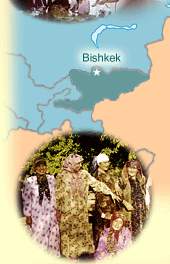
Increasing Quality and Use of Postabortion
Family Planning
Prior to independence from the Soviet Union in 1991, abortion was the principal method of fertility control in Kyrgyzstan. Contraceptives have since become more accessible and abortion rates have declined notably. Still, provision of postabortion family planning (PAFP) counseling and services—to enable women and couples to space, limit or prevent subsequent pregnancies—has not been a priority. Using the Performance Improvement (PI) approach to identify and prioritize interventions to address barriers to PAFP, PRIME II worked with primary providers to increase PAFP counseling and method provision at selected sites in the regions of Osh and Jalalabad. To improve the quality of PAFP services, PRIME also helped the Ministry of Health develop protocols and prepare trainers to teach PAFP counseling.
Key Results: Of the 104 women interviewed at baseline, 86% wanted to use a FP method postabortion and identified the method they wanted to use. However, only 19% left the facility with their method of choice. The final evaluation showed great improvement: of 48 women who wanted to use a method, 87% received one before leaving the facility.
Motivating Providers to Counsel for STIs
To find a low-cost method to motivate providers to counsel on sexually transmitted infections (STIs), PRIME II implemented a pilot project in 28 family medicine centers and clinics in Bishkek. Provider performance data were collected through exit interviews with FP clients and posted monthly in areas of the facility where only the providers could see them. Project designers hoped providers would be motivated to improve their counseling as a result of the regular visual updates on their performance combined with supportive supervision by PRIME-trained supervisors to help them address performance gaps identified by the posted data. More than 2,400 clients were interviewed for the project, and two rounds of provider and supervisor interviews were conducted to support and help interpret the client data by further documenting the effectiveness of the postings and supervision.
Key Results: The percentage of clients reporting STI prevention counseling during FP visits rose from 33% at the first posting to 56% for the sixth. Supervisors were encouraged by the results and planned to continue the postings after the pilot ended.
|











